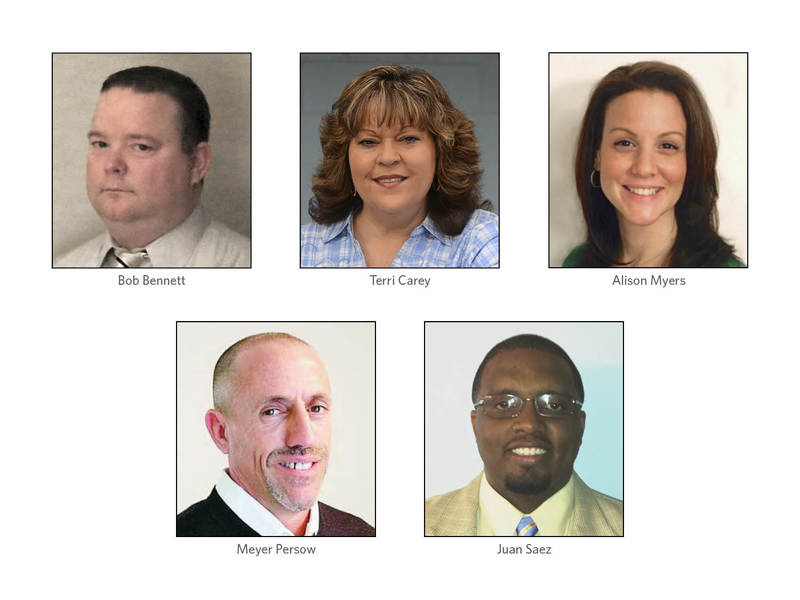Five candidates are vying for one at-large seat open on the Cape Henlopen school board. Bob Bennett, Terri Carey, Alison Myers, Meyer Persow and Juan Saez are running for the five-year seat currently held by board member Sara Wilkinson, who chose not to run for re-election. Board member Andy Lewis ran unopposed for his 5-year area C seat, representing the Midway-Angola area. The election will be held Tuesday, May 13, at three locations in the district: Cape High School, Mariner Middle School and Rehoboth Elementary School.
Candidates provided a short biography and answered the questions for the Cape Gazette. Their answers are in alphabetical order.
Bob Bennett
Age: 42
Address: Lewes
Family: Wife, Lynn. Three children attend Cape Henlopen schools
Education: Claymont High School graduate
Employment: supervisor at Sunoco Logistics
Experience: served in the U.S. Army as Infantry Medic; volunteer firefighter/EMT, EMS manager/captain; DSFS instructor; board of directors Cape Vikings Pop Warner for eight years, three years president; umpire/coach with Little League baseball and softball; president Cape High football boosters for two years; member Cape High lacrossse, cheerleading and chorale boosters.
Reason for running: Our students deserve the best possible environment to learn, our teachers and administrators must have the proper space and tools to educate and prepare students for the next steps in life.
Terri Carey
Age: 51
Address: Milton
Family: Husband, Rich. Three sons: Richard and Hunter, freshmen at Cape High, and Austin, a fifth-grader at H.O. Brittingham Elementary.
Education: 1981 graduate Georgetown Christian School
Employment: work in the Public Defender's Office; co-owner of Careys Custom Home Construction
Reason for running: I have been from Milton my whole life and very involved with the community. I decided to run for school board because I was asked by several from the community to run knowing that I was very involved with community organizations and school functions and having the interest of not only for my boys but for all the children in the Cape district.
Alison Myers
Age: 36
Address: Lewes
Family: Married, four children
Education: Bachelor's degree in economics and master's in special education from University of Delaware
Employment: Teacher for nine years in Lake Forest and Colonial school districts
Experience: Secretary, Shields PTO; member, Shields School Improvement Team, Cape Facilities Task Force III; member Cape Citizen’s Budget Oversight Committee
Reason for running: Running for school board has been a long-term goal of mine. I feel like I can use my knowledge and experience as a parent, a district committee member, and a former teacher to help make decisions that keep the Cape Henlopen School District growing and improving.
Meyer Persow
Address: Lewes
Family: Two rescue dogs, two cats
Education: Graduate University of Denver with degrees in political science and secondary education
Employment: General manager of Hobos Restaurant & Bar
Experience: Retired treasury liaison officer and disbursements policy officer for the U.S. Office of Personnel Management; religious school teacher and board member for Seaside Jewish Community; advisor for the Sussex Family YMCA’s Youth in Government program; member of American Legion Post 5 and NARFE Chapter 1690; volunteer with the Sussex Family YMCA; winner of Service to Youth Award in 2010 and the Adult Service to Youth Award from the Delaware Y’s Youth in Government Program in 2013.
Juan Saez
Age: 35
Address: Milton
Family: Wife, Christina; two sons, a daughter and raising a niece and two nephews.
Education: 1996 Cape High graduate
Employment: Co-owner Saez and Sons LLC
Experience: Coach at Mariner Middle School
Reason for running: I am running for school board because I want to ensure equality between the schools districtwide. Much of the focus is on the socio-economic issues between Milton Elementary and H.O. Brittingham when the larger socio-economic gap is between the demographics of the Milton and Lewes/Rehoboth schools, both middle and elementary.
Questions
How would you go about solving the socio-economic and racial imbalances at Milton's two elementary schools?
Bennett: I believe students should attend schools that are closest to where they live to eliminate long bus rides and inconvenience for parents who attend after school functions and meetings. School choice is a statewide and district policy that can be administered to help prevent creating some of the imbalances. A strict guideline on approvals of applications now and revised after the realignment of the soon to be five schools is the best plan.
Carey: I think that most of this will be solved with the referendum that just passed. The people of the district voted to build a new school, and the plan is to take some of the students from MES and place them in the new school. Then they will be taking students from HOB to MES. The new school is going to have a really big impact in this area. We can start looking at the demographics, but we need to see what effects the new school has before we start changing things.
Myers: The socio-economic and racial imbalance in all of the elementary schools, in particular the two Milton schools, is one that must be considered carefully. Critical factors are: Division of resources, allocation of instructional specialists, such as English languarge learner teaching, bus ride times, and the best interests of students, parents and teachers. I believe that the addition of the fifth elementary school to our district will make the task slightly easier, but that all possibilities for school lines must be considered before making a final decision. That being said, I’m not in favor of a K-2/3-5 division of the two Milton schools.
Persow: We have to look at how this was approached during the 1960s and 1970s. In major cities, the courts got involved and ordered schools to be integrated. I want to avoid that. The district needs to develop a plan to balance Milton Elementary and H.O. Brittingham racially so that each of our students has the same education opportunities. It will mean reassigning students from one school to the other, so we might want to look at eliminating school boundaries for those schools and assigning students for balance. We also have to have a racially balanced staff at both schools.
Saez: I would merge the schools, which has been discussed previously, to solve the socio-economic/racial issue between Milton Elementary and H.O. Brittingham Elementary.
Do you think Common Core Standards and the related Smarter Balanced testing will improve student achievement at Cape?
Bennett: Common Core Standards and the testing will only improve if the teachers are given the proper training and proper allotment of time to create lesson plans. Like any other new program the improvements will only come with good communication among all of the district’s teachers involved to share what plans worked well and which ones didn’t while trying to create lesson plans that can be shared so all of the students are learning the same information.
Carey: There are mixed feelings in the district, but the Delaware Board of Education has already made the decision to go with the Common Core Standards. It’s too soon to tell what the effects of their decision are, but this is a very big change for the Cape district. If the changes are positive, the state Board of Education is going to receive lots of praise. If the outcomes are negative, then they will rightly receive a lot of criticism. I plan to keep a close eye on our student achievement and either applaud them or hold them accountable, whichever the situation calls for.
Myers: There has been controversy over Common Core and Smarter-Balanced assessment both locally and nationally. I believe that the new standards will help improve student achievement. These standards emphasize critical thinking and problem-solving skills across all subject areas, and help students apply knowledge to real life. Common Core also encourages teachers to collaborate in both grade-level and subject area groups, allowing for the sharing of best practices in the classroom. I do want to be mindful of how often we are testing our students, but feel that the information gleaned from the assessments is too valuable to eliminate altogether.
Persow: I have never been a fan of requiring teachers to “teach to the test.” This takes away from the very basis of what teaching is. While I do think that we need to have national education standards, I’m not convinced that Common Core is the answer. Are we saying that higher test scores means that our students are achieving or that they are prepared to take tests? I think it’s the latter. That is not what I believe education is about. We need to enable our teachers to prepare students to solve problems and give them tools to succeed.
Saez: Students who are struggling under the current system will have a harder time with the new program. For the kids already behind, when you introduce Common Core, they're just going to dig a deeper hole.
How should schools incorporate technology in the classrooms? Should printed textbooks be eliminated in favor of e-books?
Bennett: Investigate technology grants or programs that allow for purchase of e-books or handheld devices required to incorporate what colleges and many businesses already use today. Considerations must be included when planning budgets for upgrades to software updates. The introduction of hand held technology should include elementary, middle, high school and several levels of Sussex Consortium. I wouldn’t eliminate all textbooks.
Carey: We have to keep an open mind when discussing the use of new technologies. Technology is great at reducing costs. The retail price of an iPad, for example, is roughly equivalent to the price of a single high school textbook. Yet one iPad can easily contain all the material for every textbook a student would need throughout four years of high school. That is very appealing. There are still unanswered questions though. For instance, how does our growing number of homeless students access the information they need when school is not in session? There are many things to be considered.
Myers: I am very proud of the variety and volume of quality technology Cape students are exposed to on a regular basis. I am excited about the one-to-one initiative for iPad use in the high school and believe that e-books are superior to paper text. Not only have studies shown that integration of technology into classrooms increases student engagement, but it allows for further differentiation of instruction, reaching students with different learning styles and educational needs. I believe that teaching children to use technology to learn, create and share knowledge is paramount in today’s world.
Persow: Since we are becoming more and more technology based in everything we do, why are we continuing to purchase hard-copy textbooks? I think it’s time we look at alternatives. One of those alternatives is to go paperless by using iPads as textbooks. There are numerous organizations out there that we could work with for grant money to start this at the high school. Using iPads would familiarize students with technology and simplify updating textbooks each year. If we teamed up with other school districts in the state, we could leverage the cost of purchasing new downloads of textbooks.
Saez: I do not believe printed textbooks should be eliminated at this time, since not everyone has computers/internet at home to access e-book content, which would make completing homework difficult.
Melissa Steele is a staff writer covering the state Legislature, government and police. Her newspaper career spans more than 30 years and includes working for the Delaware State News, Burlington County Times, The News Journal, Dover Post and Milford Beacon before coming to the Cape Gazette in 2012. Her work has received numerous awards, most notably a Pulitzer Prize-adjudicated investigative piece, and a runner-up for the MDDC James S. Keat Freedom of Information Award.
























































